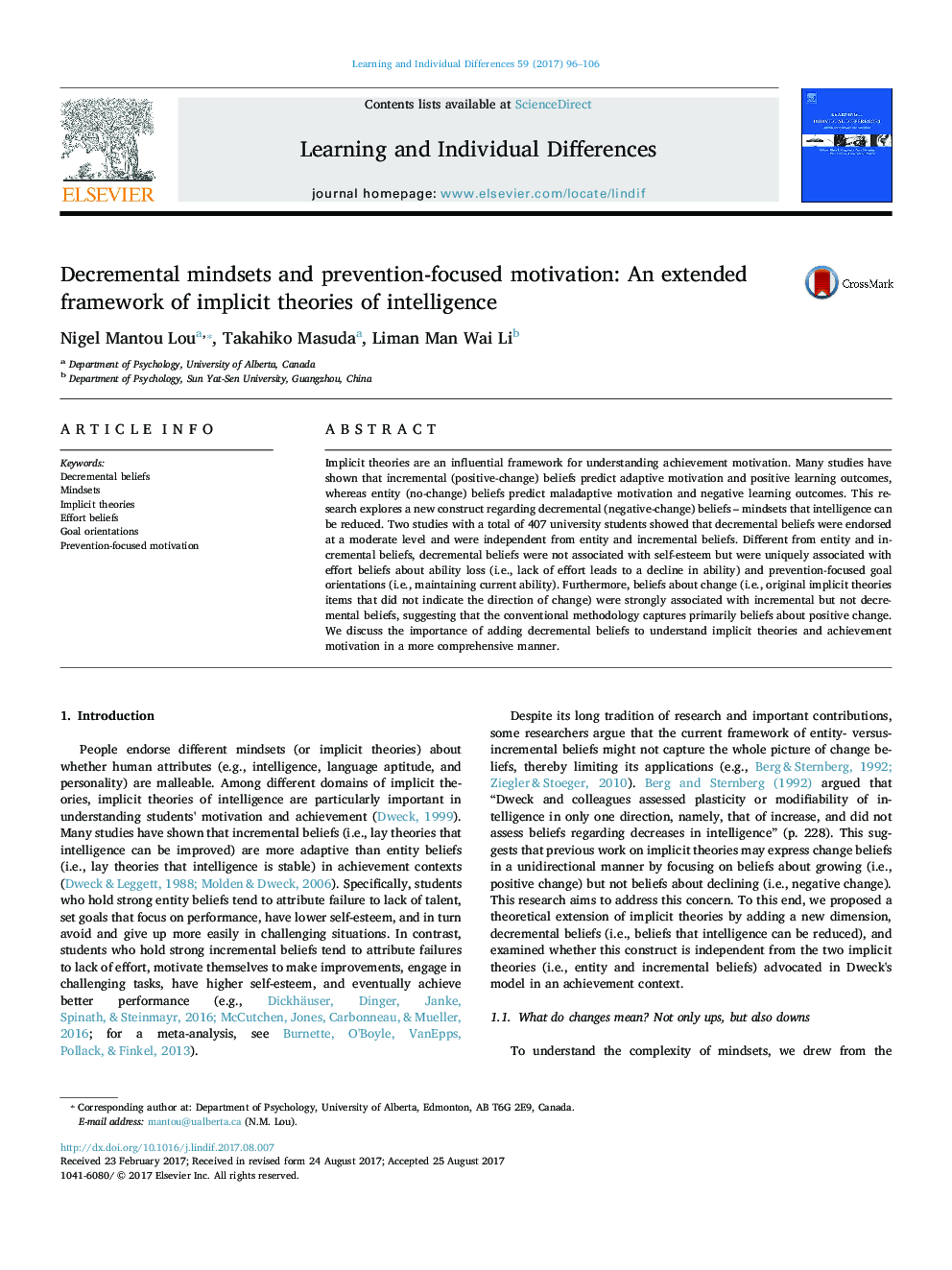| کد مقاله | کد نشریه | سال انتشار | مقاله انگلیسی | نسخه تمام متن |
|---|---|---|---|---|
| 4940027 | 1436364 | 2017 | 11 صفحه PDF | دانلود رایگان |
عنوان انگلیسی مقاله ISI
Decremental mindsets and prevention-focused motivation: An extended framework of implicit theories of intelligence
ترجمه فارسی عنوان
ذهنیت های ذهنی و انگیزه متمرکز بر پیشگیری: یک چارچوب توسعه یافته از نظریه های ضمنی اطلاعات
دانلود مقاله + سفارش ترجمه
دانلود مقاله ISI انگلیسی
رایگان برای ایرانیان
ترجمه چکیده
تئوری های نامتعارفی چارچوب موثر برای درک انگیزه های موفقیت است. بسیاری از مطالعات نشان داده اند که اعتقادات مثبت (تغییر مثبت)، انگیزه های سازگاری و نتایج مثبت یادگیری را پیش بینی می کنند، در حالی که اعتقادات انسانی (بدون تغییر) انگیزه های ناسازگارانه و نتایج یادگیری منفی را پیش بینی می کنند. این تحقیق، یک ساختار جدید در مورد باورهای تغییر پذیری (تغییر منفی) را بررسی می کند - ذهنیت هایی که هوش را می توان کاهش داد. دو مطالعه در مجموع 407 دانشجوی دانشگاه نشان دادند که اعتقادات کاهش یافته در سطح متوسط تأیید شده و مستقل از اعتقادات انسانی و تکاملی هستند. برخلاف اعتقادات ذاتی و افزایشی، اعتقادات حکمت با اعتماد به نفس خود ارتباطی نداشتند، اما به طور منحصر به فرد با باورهای تلاش در مورد از دست دادن توانایی (یعنی کمبود تلاش منجر به کاهش توانایی) و جهت گیری های هدف متمرکز بر پیشگیری (یعنی حفظ جریان توانایی) علاوه بر این، اعتقادات مربوط به تغییر (یعنی نظریه های تثبیت کننده ی اصلی که جهت تغییر را نشان نمی دادند) به شدت با باورهای افزایشی، اما نه کاهش یافته، ارتباط داشتند، که به این معنی است که روش متداول اساسا اعتقاد به تغییر مثبت است. ما در مورد اهمیت اضافه کردن باورهای قضایی برای درک نظریات ضمنی و انگیزه موفقیت در جامعتری بحث می کنیم.
موضوعات مرتبط
علوم انسانی و اجتماعی
روانشناسی
روانشناسی رشد و آموزشی
چکیده انگلیسی
Implicit theories are an influential framework for understanding achievement motivation. Many studies have shown that incremental (positive-change) beliefs predict adaptive motivation and positive learning outcomes, whereas entity (no-change) beliefs predict maladaptive motivation and negative learning outcomes. This research explores a new construct regarding decremental (negative-change) beliefs - mindsets that intelligence can be reduced. Two studies with a total of 407 university students showed that decremental beliefs were endorsed at a moderate level and were independent from entity and incremental beliefs. Different from entity and incremental beliefs, decremental beliefs were not associated with self-esteem but were uniquely associated with effort beliefs about ability loss (i.e., lack of effort leads to a decline in ability) and prevention-focused goal orientations (i.e., maintaining current ability). Furthermore, beliefs about change (i.e., original implicit theories items that did not indicate the direction of change) were strongly associated with incremental but not decremental beliefs, suggesting that the conventional methodology captures primarily beliefs about positive change. We discuss the importance of adding decremental beliefs to understand implicit theories and achievement motivation in a more comprehensive manner.
ناشر
Database: Elsevier - ScienceDirect (ساینس دایرکت)
Journal: Learning and Individual Differences - Volume 59, October 2017, Pages 96-106
Journal: Learning and Individual Differences - Volume 59, October 2017, Pages 96-106
نویسندگان
Nigel Mantou Lou, Takahiko Masuda, Liman Man Wai Li,
